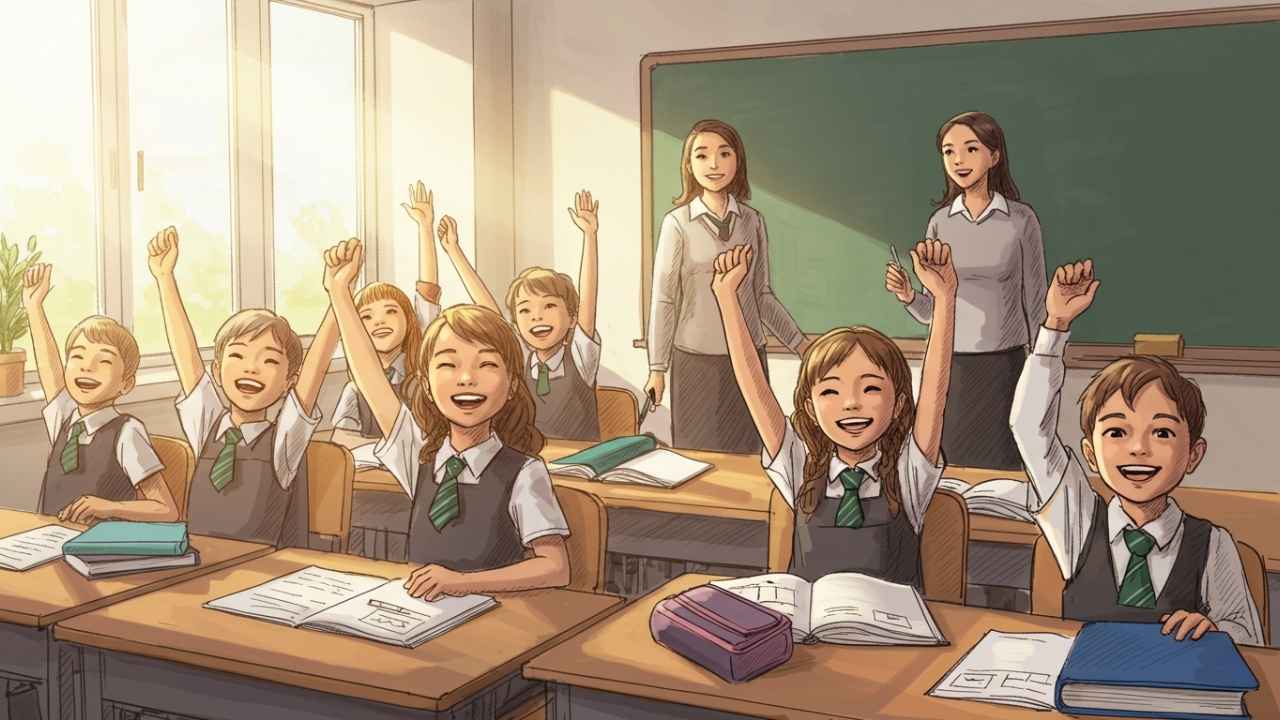Story For Students Motivation: Students face many problems every day. Sometimes, they feel tired or want to give up. These short stories give hope, teach lessons, and show that hard work always helps. These stories are simple and easy to understand. They will make students smile, think, and feel ready to do their best.
The Boy Who Didn’t Give Up

Ravi was a small boy from a village. He was not very smart in school. Other children often laughed at him. Even his teacher sometimes lost hope.
But Ravi had one thing. He never stopped trying.
Every day, he woke up early. He read his books slowly but with care. He asked many questions in class. Some children made fun of him, but he did not listen to them.
At home, his father worked in the fields. His mother cooked and helped him study. They were not rich, but they always smiled. They told Ravi, “Keep trying, one day you will do well.”
One day, there was a test in school. Ravi was scared, but he had studied hard. When the results came, something amazing happened.
Ravi passed the test!
It was not the highest score, but it was his first time passing. He was very happy. His teacher smiled and said, “Well done, Ravi. I am proud of you.”
From that day, Ravi kept moving forward. He studied every day. He failed sometimes, but he did not stop.
Years passed. Ravi became a teacher in the same school where he once failed.
Now, he tells his students, “It’s okay to be slow. Just don’t stop. One step each day can take you far.”
And the children listen, because they know—Ravi was once like them.
Moral: Hard work and hope can change your life. Never give up.
Meena and the Broken Shoes

Meena was a girl from a small town. She loved going to school. But her family was poor. She had only one pair of shoes, and they were old and broken.
One rainy morning, her shoes tore while walking to school. Water came in, and her feet got wet. Some children laughed. One of them said, “Why don’t you stay home?”
Meena felt bad, but she did not stop. She reached school and sat in the front row. She listened to the teacher with bright eyes. She wanted to learn more, not less.
That day, the teacher gave a surprise test. Meena used her pencil carefully. Her paper was clean and her answers were correct.
Next day, the teacher called her name, “Meena got the highest marks!”
All the children clapped. The same ones who laughed were now silent.
The teacher gave her a small gift — a new pair of shoes.
Meena’s eyes filled with tears, not because of the shoes, but because someone believed in her.
From that day, Meena walked with more confidence. She studied harder and helped other children too.
Later, she became a school principal. She kept those old shoes safely in a box — to remind herself: “Tears, mud, and broken things cannot stop a strong heart.”
Moral: Your dreams are bigger than your problems. Keep walking.
The Empty Lunch Box

Arjun was in class five. He was always smiling. But there was one thing no one knew — he never brought lunch to school.
His family didn’t have enough food. So, every day, Arjun drank water and said, “I’m not hungry.”
One day, his friend Rishi noticed. He saw Arjun sitting alone during lunch break, watching others eat.
Rishi went home and told his mother. The next day, Rishi brought two lunch boxes — one for him, one for Arjun.
Arjun was shocked. “Why are you giving me this?” he asked.
Rishi smiled and said, “Because you’re my friend.”
From then on, Rishi shared his lunch every day. Arjun was thankful, but he didn’t just take help — he also started working hard.
He read books from the library. He asked his teacher for extra questions. Slowly, his marks got better.
After some time, Arjun came first in his class.
On the last day of school, he gave Rishi a small note. It said:
“Your food filled my stomach. Your kindness filled my heart. One day, I’ll do the same for someone else.”
Years later, Arjun became a doctor. He helped poor children in his town. He gave them food, books, and hope.
And in his clinic, he kept a small photo of his school friend — Rishi.
Moral: A small act of kindness can change someone’s whole life.
What if I Forget my Words

Anita was a shy girl. She hardly spoke in class. Even when she knew the answer, she stayed quiet. Her classmates called her “silent girl.” Some even teased her.
But Anita was not weak. She listened carefully, studied every evening, and wrote everything in her notebook. Her dream was to stand on stage one day and speak without fear.
One day, the teacher said, “We will have a speech competition next week. Anyone can join.”
Anita wanted to take part, but her heart beat fast. “What if I forget my words?” she thought. She almost gave up. But at night, her grandmother said, “Even the river starts as a small stream. Don’t be afraid.”
Those words stayed in her heart.
The next day, Anita gave her name for the speech.
She practiced every day — in front of the mirror, in front of her little brother, even to her dog. Her voice shook at first, but she didn’t stop.
The day of the competition came. One by one, the students gave their speeches. Some spoke loudly, some made jokes.
Then it was Anita’s turn.
She walked to the stage. Her hands were cold. She looked at the crowd, took a deep breath, and began.
Her voice was soft at first, but full of feeling. She spoke about dreams, about fear, about trying again and again.
When she finished, the room was silent. Then came the loudest clap she had ever heard.
She didn’t win the first prize. But something better happened — she won everyone’s respect.
From that day, no one called her “silent girl.” She was Anita — the brave girl who spoke from the heart.
Moral: Even a quiet voice can be strong, when it speaks with truth and courage.
The Pencil and the Eraser

Rahul loved drawing. He didn’t have expensive colors or drawing books. All he had was one pencil and a small eraser.
He used old notebooks and drew on the empty pages. His pencil was short, and the eraser was almost finished. But he smiled every time he drew.
One day, the school announced a drawing competition. Rahul wanted to join, but he looked at his tiny pencil and thought, “This is not enough.”
He went home and told his mother. She didn’t have money to buy new things, but she said, “Use what you have. Do your best. That is enough.”
Rahul nodded. He sharpened his little pencil carefully. He found a clean page in an old book and started drawing.
He drew a village with trees, birds, and smiling people. He made some mistakes, but his eraser helped him again and again. Slowly, his picture came to life.
On the day of the competition, other children had big color boxes and clean white sheets. Rahul felt a little nervous. But he took out his folded page and started drawing again.
When the judges came, they stopped at Rahul’s desk. One of them said, “This picture has something special.”
Later, they announced the winners.
Rahul won second prize!
His eyes filled with tears. He looked at his pencil and eraser and whispered, “Thank you, my friends.”
That day, Rahul learned something very important.
Moral: It’s not about what you have. It’s about how you use it with love and effort.
The Last Bench Boy

Manoj always sat on the last bench in class. He didn’t talk much. He was slow in writing and reading. Some children laughed at him. Even the teacher sometimes forgot his name.
But Manoj had something special. He never missed school. Rain or sun, he came every day with his small bag and big dreams.
One day, the teacher gave a project to the class. “Make a small model of anything you like,” she said. The best model will get a prize.
All the children were excited. They started talking about robots, big houses, and airplanes.
Manoj stayed silent.
He went home and thought, “What can I make?”
He looked around and saw his mother cooking on a mud stove. Then he had an idea.
He found some clay near the pond, some small sticks, and a matchbox. Slowly, he made a tiny model of a village kitchen — with a stove, pots, and even smoke made from cotton.
He brought it to school, wrapped in a cloth.
Other children had bright models with colorful lights. Manoj placed his simple model quietly on the corner of the table.
When the teacher came, she looked at each model. Then she saw Manoj’s.
She picked it up and said, “Who made this?”
Manoj stood up, nervous.
“This is beautiful,” she said. “It shows real life. It shows effort.”
Manoj’s eyes sparkled. For the first time, everyone clapped for the last bench boy.
From that day, Manoj sat in the middle row. He smiled more. And slowly, the class saw what the teacher had seen — a quiet boy with a bright heart.
Moral: Everyone has talent. Sometimes, it just needs a chance to shine.
The Rainy Day Promise

Sita was a cheerful girl. She loved to learn, but her school was far away. Every day, she walked three kilometers through fields and small roads.
One morning, dark clouds filled the sky. Her mother said, “It might rain. Do you want to stay home?”
Sita looked at her books, then at the sky, and said, “I gave myself a promise — I will not miss school.”
She took a plastic sheet, covered her books, and started walking.
Halfway, it began to rain. Heavy drops fell fast. The road became slippery. Her clothes were wet, and her feet were covered in mud.
She slipped once, but stood up quickly. “I must reach,” she told herself again and again.
When she reached school, only five children were present. The teacher looked at her, surprised.
“You came in this rain?” she asked.
Sita smiled, teeth chattering, and said, “Yes, Ma’am. I made a promise to myself.”
The teacher gave her dry clothes from the school box and a cup of warm tea. That day, Sita sat in class, cold but happy.
She listened with full attention and answered all the questions.
The next week, the school had a small award function. To everyone’s surprise, Sita’s name was called.
“For never breaking her promise to learning,” the teacher said, “we give this badge of courage to Sita.”
Sita held the badge close to her heart. It was small, but it felt big.
Moral: When you stay true to your word, the world sees your strength.
The Chalk in His Pocket

Deepak was the son of a cleaner. His father cleaned the school floors every morning before the bell rang. Deepak studied in the same school.
He was quiet, but he loved to watch the teachers write on the blackboard. He admired the white chalk in their hands — so small, but it taught so much.
At home, Deepak had no slate, no notebook. But he had one chalk piece — a broken one he found near the school bin. He kept it safely in his pocket.
Every evening, after helping his father, he would find a clean wall in the corner of his house. He used that wall as his board and the broken chalk as his pen.
He practiced math, wrote spellings, and even drew pictures. His hands turned white with chalk dust, but his eyes shone with joy.
One day, a teacher noticed Deepak staying back after school. She followed him and saw him picking up chalk pieces from the dustbin.
She called him gently, “Why do you take broken chalk?”
Deepak looked down and said, “Because it helps me learn.”
The teacher smiled and said nothing. The next day, she gave him a new box of chalk and an old slate from the store room.
From that day, Deepak learned faster. He started coming first in class.
Years later, he became a teacher in the same school. On his first day, he took out a small box from his bag — inside was that same old broken chalk.
He showed it to his students and said, “This small piece gave me big dreams.”
Moral: Even small things can lead to big changes when the heart is full of hope.
The Window Seat

Rani loved the window seat in her classroom. From there, she could see the trees, birds, and sometimes a rainbow after the rain. It made her feel calm.
But the window seat was not hers. It belonged to another girl, Priya, who always came early. One day, Priya was absent. Rani sat on the window seat and smiled all through the class.
The next day, Rani came early and sat there again. But Priya arrived and said, “That’s my seat.” Rani moved without a word, but her heart felt heavy.
That night, Rani told her mother, “I wish I had the window seat. I feel happy there.”
Her mother looked at her and said gently, “Then make every seat your window seat.”
Rani didn’t understand at first. But the next day, she tried something new. She came early, but instead of rushing to the window, she sat in the middle row.
She smiled and said, “This is my window today.”
Every day after that, Rani picked a new place to sit. Front, back, corner — she made each seat special. She looked around, made new friends, and listened more carefully.
One day, the teacher said, “Rani, you have changed. You are brighter, more active. What happened?”
Rani smiled and said, “I stopped waiting for one seat. I started enjoying every place I sit.”
From that day, Rani was happy everywhere. She learned that joy is not in a seat — it is in the mind.
Moral: Don’t wait for the perfect place. Make every place perfect with your smile and effort.
The Boy with Slow Hands

Aman was slower than other kids. He wrote slowly, walked slowly, and even tied his shoelaces slowly. Because of this, many children laughed at him.
“Why are you always so slow?” they teased.
Aman never replied. He just kept doing his work, one step at a time. His notebooks were always clean. His drawings were simple, but full of care. He never rushed.
One day, the school held a drawing contest. Everyone had to finish their artwork in 30 minutes. The class was full of noise — pencils scratching, erasers falling, papers moving.
Aman sat quietly. He didn’t hurry. His hand moved slowly, but with full attention. He drew a small bird sitting on a branch, with the sun rising behind it.
When the time was over, some children had unfinished work. Some had messy colors. But Aman had finished his drawing, neat and beautiful.
The teacher looked at all the pictures. Then she picked Aman’s and said, “This one shows care, peace, and love.”
Aman won the first prize.
Everyone was surprised. The same boy who always came last was now standing first.
From that day, the children stopped laughing at him. They started helping him and learning from him.
Aman showed them that slow hands can also do beautiful work — and sometimes, even better.
Moral: Going slow is not a weakness. It can be your strength when you do things with love and care.








